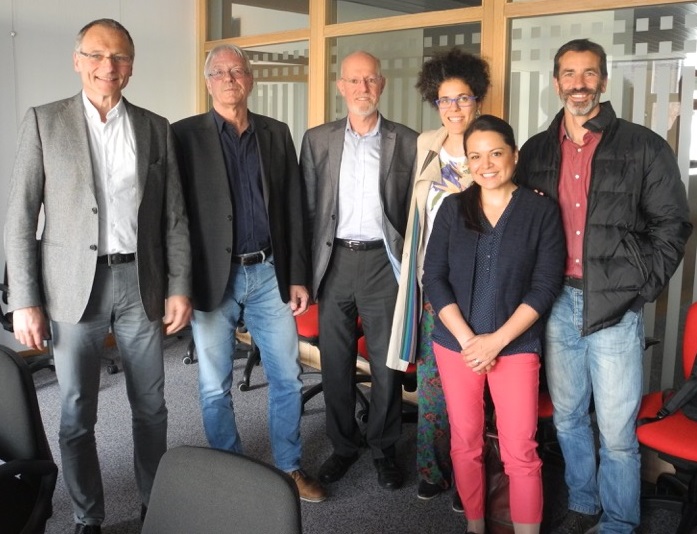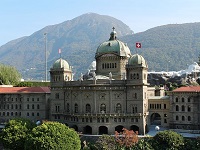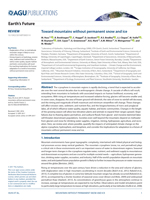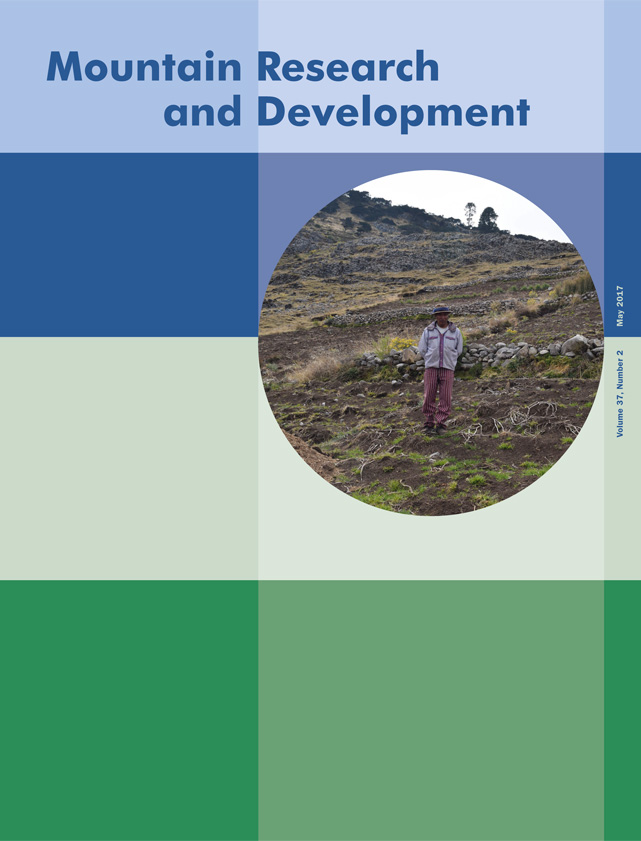News
- Details
- Category: Global News
MRI kicks off new phase with internal meeting in Bern
Newly appointed MRI Executive Director, Carolina Adler, recently convened a meeting in Bern with the MRI Chair and team of MRI Principle Investigators, to kick-off planning proceedings and mark a new phase for MRI as a service to the mountain research community. The meeting was held in early June at the MRI offices in Bern, focusing on the institutional set up of MRI under the Swiss Academies of Sciences, SCNAT, as well as the diverse number of MRI's projects and activities that have galvanised the mountain research community over the years. One of the key topics also covered, included the set up and relationships with existing regional networks within the MRI fold, and other global networks such as Future Earth, with a view towards coordinating efforts to continue to foster and connect with these networks, and connect to other existing networks in other regions that have relevance and importance for scientific research in mountain areas. Other topics covered included the work underway to conduct a review and audit to help redefine a new communications strategy for MRI, as well as specify a framework and tasks for a new work plan. Next steps in this planning phase, includes a meeting with the members of the MRI Science Leadership Council, who play a leading and important role in both strategic input and implementation for much of MRI work in the regions. All in all, these are busy but extremely exciting times for MRI and we look forward to sharing this progress during 2017.
MRI visits Brussels to meet with MRI Europe Leadership Group and Euromontana
 Members of the MRI Europe Leadership Group recently convened a meeting in Brussels at the end of May, to galvanise interest within the mountain research community in Europe and continue efforts to promote mountain research for policy and practice in the European context. Joined by the current MRI Executive Director, Carolina Adler, the attendees also had the chance to revisit stated goals outlined in the Strategic Research Agenda: Mountains for Europe's Future, with a view towards strategic input to discussions and preparations for the next (9th) Framework Programme for research funding in Europe, most likely to cover the period 2021 – 2027. Many agreed actions were defined for follow up, including the establishment of a Network for European Mountain Research within the European association of mountain areas, Euromontana. For more information about the outcomes of this initial meeting, and other relevant information for interested parties to participate in these initiatives in Europe, are asked to contact MRI at This email address is being protected from spambots. You need JavaScript enabled to view it.
Members of the MRI Europe Leadership Group recently convened a meeting in Brussels at the end of May, to galvanise interest within the mountain research community in Europe and continue efforts to promote mountain research for policy and practice in the European context. Joined by the current MRI Executive Director, Carolina Adler, the attendees also had the chance to revisit stated goals outlined in the Strategic Research Agenda: Mountains for Europe's Future, with a view towards strategic input to discussions and preparations for the next (9th) Framework Programme for research funding in Europe, most likely to cover the period 2021 – 2027. Many agreed actions were defined for follow up, including the establishment of a Network for European Mountain Research within the European association of mountain areas, Euromontana. For more information about the outcomes of this initial meeting, and other relevant information for interested parties to participate in these initiatives in Europe, are asked to contact MRI at This email address is being protected from spambots. You need JavaScript enabled to view it.From left to right: Tor Arnesen (Eastern Norway Research Institute, Norway); Thomas Scheurer (ICAS & ISCAR, Switzerland); Martin Price (Centre for Mountain Studies Perth College, University of the Highlands and Islands, Scotland); Evgenia Tsianou (MRI Europe officer), Carolina Adler (MRI Executive Director), and Bernat Claramount (University of Barcelona, Spain). Photo courtesy of Euromontana.
Ahead on the MRI agenda for mountain-related events in 2017
July: Inaugural lecture at the Himalayan University Consortium (HUC), at the International Centre for Integrated Mountain Development (ICIMOD), in Kathmandu, Nepal.
August: Presentation and participation at the International Forum on Social Sciences “Interdisciplinary dialogues on climate change, disasters and governance”, in Cusco, Peru.
October: International Climbing and Mountaineering Federation’s (UIAA) General Assembly, Tehran, Iran.
November: 15th Swiss Geoscience Meeting 2017 (SGM 2017), "Moving Boundaries", in Davos, Switzerland.
December: Mountain Partnership’s high-level conference on mountains “Mountains under Pressure”, at the Food and Agriculture Organization of the United Nations (FAO) in Rome, Italy.
- Details
- Category: Global News
A recap of news and activities from the MRI office for the month of July, including a visit to ICIMOD in Kathmandu, Nepal, to deliver inaugural lecture on Disater Risk and Water Management at the Himalayan University Consortium Academy 2017; activities related to the sixth assessment report cycle for the Intergovernmental Panel on Climate Change (IPCC); a call to the MRI community to contribute with views and feedback on newsletters and communications at MRI, and more....
- Details
- Category: Global News
A warm welcome to our new staff at MRI
| The MRI grows! We are pleased to announce that the MRI office is now joined by two new staff members, Ms Grace Goss-Durant and Mr Christoph Bacher. Grace has been appointed as the new MRI Communications Manager, a professional with strong editorial skills and a proven track record in project management, planning, and production of communications materials for a variety of publications and online channels. With degrees in environmental social sciences, climate change & sustainable development and a postgraduate degree in creative writing, Grace will oversee MRI’s new communications strategy and implementation of key communication products to showcase the MRI’s research community contributions to science in the mountains. Christoph Bracher joins the MRI as Research Assistant. He holds a masters degree in environmental history and is currently completing a second masters degree in geography. At the MRI, he is contributing to research tasks related to MRI’s commitments under the Sustainable Mountain Development for Global Change program, engaging with key MRI regional partners in assessing the state of the UN Sustainable Development Goals (SDGs) and their application and relevance for mountain regions. We look forward to working with both Grace and Christoph and jointly work towards this new phase at MRI – Welcome! |
 Grace Goss-Durant |
|
|
|
Ahead on the MRI agenda for mountain-related events in 2017
1. First authors meeting for the IPCC Special Report on Oceans and Cryospehere, Nadi, Fiji.
2. International Climbing and Mountaineering Federation’s (UIAA) General Assembly, Tehran, Iran.
November:
1. 6th International Symposium for Research in Protected Areas, Salzburg, Austria.
2. 15th Swiss Geoscience Meeting 2017 (SGM 2017), "Moving Boundaries", in Davos, Switzerland.
December:
1. ICIMOD's International Conference on Resilient Hindu Kush Himalaya: Developing Solutions towards a Sustainable Future for Asia.
2. MRI's Science Leadership Council meeting, Rome, Italy.
3. Mountain Partnership’s high-level conference on mountains “Mountains under Pressure”, at the Food and Agriculture Organization of the United Nations (FAO) in Rome, Italy.
- Details
- Category: Global News
 October has been a busy month for the MRI office! We've attended and participated in key international events, and taken some intense initial steps towards internal planning and strategy-building for the MRI's new focus from 2018 onwards.
October has been a busy month for the MRI office! We've attended and participated in key international events, and taken some intense initial steps towards internal planning and strategy-building for the MRI's new focus from 2018 onwards.
On behalf of the MRI, Executive Director Dr. Carolina Adler attended a number of events in October. These included the IPCC's first authors meeting for the Special Report on the Ocean and Cryosphere in a Changing Climate (SROCC) held in Fiji and the General Assembly of the International Climbing and Mountaineering Federation (UIAA) held in Shiraz, Iran.
- Details
- Category: Global News
The special issue, with guest co-editors Carolina Adler (MRI), Christian Huggel (University of Zurich), Anne Nolin (Oregon State University) and Ben Orlove (Columbia University), will be published in the journal Regional Environmental Change (REC), focusing on the impacts of climate change on the high-mountain cryosphere and downstream regions as well as response to these impacts.
Through this special issue, we seek to highlight contributions from the mountain research community in providing the Intergovernmental Panel on Climate Change (IPCC) Special Report on Oceans and Cryosphere in a Changing Climate (SROCC) assessment process with state-of-the-art knowledge and evidence for impacts and adaptation in mountain regions. For this reason, we strongly encourage the mountain research community to make their research known and accessible for this assessment process via this special issue. Paper proposals, as extended abstracts, are to be submitted to the guest editors by 1 August 2017.
- Details
- Category: Global News

Huss, M., Bookhagen, B., Huggel, C., Jacobsen, D., Bradley, R., Clague, J., Vuille, M., Buytaert, W., Cayan, D., Greenwood, G., Mark, B., Milner, A., Weingartner, R., and Winder, M. (2017): Towards mountains without permanent snow and ice. Earth's Future, 5, doi:10.1002/2016EF000514.
- Details
- Category: Global News
 Articles in MRD often relate to the climate change debate at the core of the IPCC process currently gearing up for the 6th Assessment Report. Two papers in this open issue offer contrasting positions: one is critical and advocates a stronger local perspective (on mismanagement of irrigation water and landslips in Pakistan), the other uses the global perspective to discover patterns (in a review of climate change impacts on ecosystem services). Other papers deal with maize diversity and poverty reduction in Guatemala, offer a new approach to assessing tap water recharge in Japan, present a method for measuring bark biomass in Nepal, and assess the habitat ecology of a profitable but endemic resource in Tibet.
Articles in MRD often relate to the climate change debate at the core of the IPCC process currently gearing up for the 6th Assessment Report. Two papers in this open issue offer contrasting positions: one is critical and advocates a stronger local perspective (on mismanagement of irrigation water and landslips in Pakistan), the other uses the global perspective to discover patterns (in a review of climate change impacts on ecosystem services). Other papers deal with maize diversity and poverty reduction in Guatemala, offer a new approach to assessing tap water recharge in Japan, present a method for measuring bark biomass in Nepal, and assess the habitat ecology of a profitable but endemic resource in Tibet.
The issue is available online and open access:
http://www.bioone.org/toc/mred/37/2
Read about the journal’s section policies, guidelines, and submission procedure at:
http://www.mrd-journal.org/
The MRD Editorial Team
MRD Editorial Office, University of Bern, Centre for Development and Environment
This email address is being protected from spambots. You need JavaScript enabled to view it.
- Details
- Category: Global News
11-12 September, Crans-Montana, Switzerland
Climate change has global causes and effects. This conference addresses growing challenges and their consequences for fragile environments both in the high latitudes and high altitudes, focusing on the polar regions and the Alps. It brings together researches from natural and social sciences to facilitate dialogue among experts with the aim of comparing observations from these regions, tracing causal chains, and connecting the global and local scales of analysis. Problem-based issues such as biodiversity, urbanization, permafrost, health and risk management, structure the conference workshops.
The conference’s emphasis on links between local and global processes, as well as its interdisciplinary approach, also enable the promotion of academic and public awareness on the climate change mechanisms impacting familiar and distant locations.







